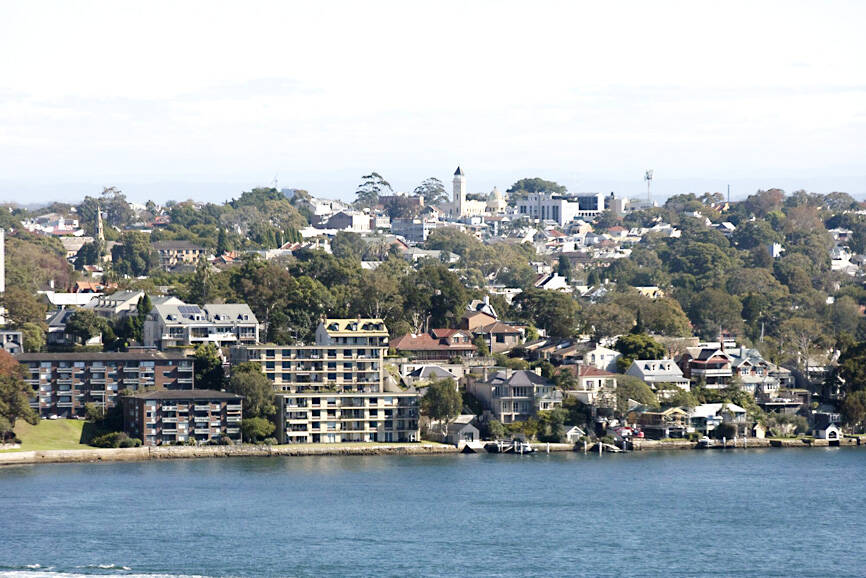Australia is to impose a dramatic rise in fees on foreign buyers of existing homes who leave them empty, the government said yesterday as it tries to ease a rental crisis.
The center-left Labor government said it would introduce new legislation next year to help alleviate tight supply that has left many renters struggling to find somewhere to live.
As supply dwindled, rental prices surged 7.6 percent in Australia in the year to Sept. 30, the sharpest increase in 14 years, official statistics show.

Photo: Bloomberg
“There are too many properties empty around Australia,” Australian Treasurer Jim Chalmers said in an interview with Sky News Australia. “There are not enough homes available to Australians who desperately need them.”
The measures aim to push foreigners to invest in new housing developments instead of buying existing stock, the government said in a statement.
Foreigners are already barred from purchasing established homes in Australia unless they live in the country for work or study, and they are usually required to sell the homes when they leave.
To buy an existing home, foreigners currently pay a foreign investment fee that varies depending on the home price — for example, A$28,200 (US$18,558) for a median-priced Sydney home of a little over A$1 million.
Under the new scheme, the fee would be tripled.
In addition, foreign owners of established homes that are vacant for more than six months would face a higher annual vacancy fee.
That fee — now the same level as the foreign investment fee — would be doubled under the new plan.
The overall effect of the double blow would be a sixfold increase in annual fees for foreigners who leave existing homes vacant.
However, it is unclear if foreign ownership of existing homes in Australia is a big problem for the rental market. Chalmers said vacancy fees imposed on foreign owners of established homes raised only about A$5 million a year.
One report indicated there were just 23 such “breaches” in the past year, Chalmers said, although he believed the numbers “are likely to be underdone.” The government said it would also lower the fees for foreign investors in build-to-rent projects.

Taiwan Semiconductor Manufacturing Co (TSMC, 台積電) would not produce its most advanced technologies in the US next year, Minister of Economic Affairs J.W. Kuo (郭智輝) said yesterday. Kuo made the comment during an appearance at the legislature, hours after the chipmaker announced that it would invest an additional US$100 billion to expand its manufacturing operations in the US. Asked by Taiwan People’s Party Legislator-at-large Chang Chi-kai (張啟楷) if TSMC would allow its most advanced technologies, the yet-to-be-released 2-nanometer and 1.6-nanometer processes, to go to the US in the near term, Kuo denied it. TSMC recently opened its first US factory, which produces 4-nanometer

PROTECTION: The investigation, which takes aim at exporters such as Canada, Germany and Brazil, came days after Trump unveiled tariff hikes on steel and aluminum products US President Donald Trump on Saturday ordered a probe into potential tariffs on lumber imports — a move threatening to stoke trade tensions — while also pushing for a domestic supply boost. Trump signed an executive order instructing US Secretary of Commerce Howard Lutnick to begin an investigation “to determine the effects on the national security of imports of timber, lumber and their derivative products.” The study might result in new tariffs being imposed, which would pile on top of existing levies. The investigation takes aim at exporters like Canada, Germany and Brazil, with White House officials earlier accusing these economies of

Teleperformance SE, the largest call-center operator in the world, is rolling out an artificial intelligence (AI) system that softens English-speaking Indian workers’ accents in real time in a move the company claims would make them more understandable. The technology, called accent translation, coupled with background noise cancelation, is being deployed in call centers in India, where workers provide customer support to some of Teleperformance’s international clients. The company provides outsourced customer support and content moderation to global companies including Apple Inc, ByteDance Ltd’s (字節跳動) TikTok and Samsung Electronics Co Ltd. “When you have an Indian agent on the line, sometimes it’s hard

PROBE CONTINUES: Those accused falsely represented that the chips would not be transferred to a person other than the authorized end users, court papers said Singapore charged three men with fraud in a case local media have linked to the movement of Nvidia’s advanced chips from the city-state to Chinese artificial intelligence (AI) firm DeepSeek (深度求索). The US is investigating if DeepSeek, the Chinese company whose AI model’s performance rocked the tech world in January, has been using US chips that are not allowed to be shipped to China, Reuters reported earlier. The Singapore case is part of a broader police investigation of 22 individuals and companies suspected of false representation, amid concerns that organized AI chip smuggling to China has been tracked out of nations such